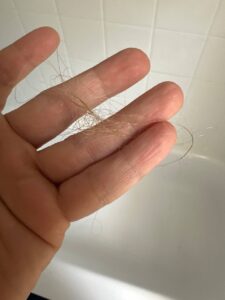How Much Hair Loss Is Too Much? When to Know If It’s a Problem
Everyone sheds hair—it’s a natural part of the hair’s lifecycle. On average, losing about 50 to 100 hairs per day is considered normal, even if you might notice a clump of hair in the shower drain or some breakage while brushing. But when does loss shift from being a routine occurrence to a signal of an underlying issue? This article delves into the signs that your hair loss might be more serious than typical shedding, provides key facts , and discusses potential causes and treatments.
Understanding Hair Loss: Facts and Figures
Hair grows from follicles under the skin and goes through cycles of growth, rest, and shedding. Disruptions in these cycles can lead to noticeable hair loss. Alopecia, the medical term for loosing your hair, can be temporary or permanent and can affect just your scalp or your entire body. While it is often associated with aging, various factors can trigger it at any age.
Signs of Excessive Hair Loss
It’s important to monitor the amount and pattern of loss. Here are some signs that it may be excessive:
Large Clumps of Hair: Losing large clumps of hair while washing or combing, especially if this is a sudden change.
Thinning Areas: Noticeable thinning areas or bald patches on the scalp.
Overall Thinning: A visible reduction in volume and coverage that others begin to notice.
Scalp Visibility: Increased scalp visibility through the hair, especially at the crown of the head.
Here are some questions to ask yourself if you suspect you are loosing too much hair
Medications: Have you started or changed your medication recently? Certain drugs, like antidepressants, blood thinners, and medications for high blood pressure, can cause hair loss.
Dietary Changes: Have there been any significant changes in your diet? Nutritional deficiencies, particularly in iron, protein, and vitamins B12, D, and A, can lead to hair shedding.
Weight Loss: Have you experienced significant weight loss recently? Rapid weight loss can shock the body, resulting in temporary hair loss.
Common Causes of Hair Loss
Understanding the potential triggers can help you address the root cause.
Genetic Factors: Hereditary hair loss or androgenetic alopecia is the most common cause.
Hormonal Changes: Conditions like pregnancy, menopause, or thyroid problems can cause hormonal imbalances that result in loss.
Medical Conditions: Autoimmune diseases, such as alopecia areata, where the immune system attacks hair follicles, can cause sudden loss.
Stress: Significant stress, whether physical or emotional, can lead to a type of hair loss called telogen effluvium.
Hairstyling Practices: Excessive heat styling, tight hairstyles, and harsh chemical treatments can damage hair and cause it to break off.
Treatment and Prevention
The good news is that many causes of hair loss are treatable. Here are some steps you can take:
Consult a Dermatologist: A dermatologist can diagnose the cause of hair loss and recommend appropriate treatment options, such as topical minoxidil (Rogaine) or finasteride (Propecia) for hereditary baldness.
Improve Your Diet and add a multivitamin: Ensure you’re getting enough iron, protein, and vitamins from your diet or consider supplements after consulting with a healthcare provider.
Reduce Stress: Techniques like meditation, regular exercise, and sufficient sleep can help manage stress.
Gentle Hair Care: Avoid harsh chemicals and heat styling. Opt for gentle, sulfate-free shampoos and conditioners, and minimize physical trauma like tight hairstyles.
Consider Topical Treatments: At Moxie Salon we recommend and carry Nioxin brand hair care that treats hair thinning at the root of the issue, literally.

Nioxin’s range of products are designed to nourish the scalp like the skin, penetrate hair at the root to increase diameter & density, and repair thinning hair from root to tip.
By understanding what’s normal and what’s not, you can better determine when to seek help for hair loss. Remember, early intervention is key to preventing further loss and potentially reversing damage. If you’re concerned about your hair loss, don’t hesitate to consult a healthcare professional who can provide guidance based on your specific condition and health history.



